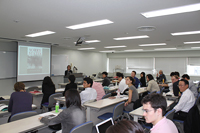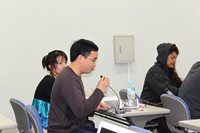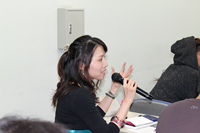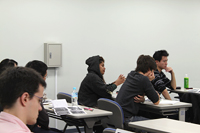Political Integration and Identity
Research:Seminars/Workshops
Sorry States: Apologies in International Politics / Jennifer Lind (Assistant Professor, Department of Government, Dartmouth College)
2009.11.10
Infomation
- Title: “Sorry States: Apologies in International Politics”
- Presenter: Jennifer Lind (Assistant Professor, Department of Government, Dartmouth College) website (Jennifer Lind, Assistant Professor, Department of Government, Dartmouth College)
- Date: Tuesday, November 10th, 2009
- Time: 10:40–12:10
- Venue: Waseda University, Building No. 19, Room 710
- Language: English (No-translation)
- Admission Free, No-preregistration
- Moderator: Chikako (Kawakatsu) UEKI, Professor, Waseda University
- Organized by GIARI : Global Institute for Asian Regional Integration(Waseda University Global COE Program)
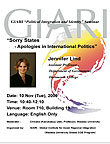
Jennifer Lind will discuss her book, Sorry States: Apologies in International Politics (Cornell University Press, 2008), which examines the role of war memory in international reconciliation. The post-World War II experiences of Japan and Germany suggest that international apologies have powerful healing effects when offered, and poisonous effects when withheld. West Germany made extensive efforts to atone for wartime crimes-formal apologies, monuments to victims of the Nazis, and candid history textbooks; Bonn successfully reconciled with its wartime enemies. By contrast, Tokyo has offered few and unsatisfying apologies and approves school textbooks that whitewash wartime atrocities. Japanese leaders worship at the Yasukuni Shrine, which honors war criminals among Japan's war dead. Relations between Japan and its neighbors remain tense.
However Lind challenges the conventional wisdom by showing that many countries have been able to reconcile without much in the way of apologies or reparations. Furthermore, she shows that contrition is highly controversial and likely to cause a domestic backlash that alarms — rather than assuages — outside observers. Apologies and other such polarizing gestures are thus unlikely to soothe relations after conflict, Lind finds, and remembrance that is less accusatory — conducted bilaterally or in multilateral settings — holds the most promise for international reconciliation.
Jennifer Lind is Assistant Professor in the Department of Government, Dartmouth College. She received a Ph.D. in Political Science from the Massachusetts Institute of Technology, a Master's in Pacific International Affairs from the University of California, San Diego, and a B.A. from the University of California, Berkeley.
Summary of GIARI Political Integration and Identity Seminar
Opening Remarks:
Professor Chikako UEKI welcomes the speaker, Professor Jennifer LIND, and the participants.
Presentation: “Sorry States: Apologies in International Politics”
States are always fighting over the interpretation of history. The conventional wisdom holds that countries must offer apologies and acts of contrition in order to reconcile after wars. Memorials, textbooks filled with vivid accounts of crimes, and apologies by heads of state reassure neighbors by signaling peaceful intentions — a lack of such actions signals the opposite. The conventional wisdom uses Post WWII West Germany as a model: it was repentant and quickly patched up relations with bitter former enemies. Therefore, goes the conventional wisdom, countries should apologize since it leads to reconciliation.
Professor Jennifer Lind tests this conventional wisdom by looking at the cases of postwar Franco-German relations, and relations between South Korea and Japan, Her analysis leads to two critiques of the conventional wisdom. First, states can reconcile without acts of contrition. As evidence she cites the same example often used to justify the conventional wisdom: the reconciliation of France and West Germany after WWII. Germany has offered numerous acts of contrition. However, it did not begin doing so until the late 1960s, by which time France already saw Germany as its closest friend and security partner. In the 20 years immediately following the end of the war, Germany glossed over its past and focused on rebuilding. During that time, Germans did not deny or glorify their wartime behavior, but neither did they apologize for it. Lind also points to the post-war reconciliation between America and Japan, bitter enemies who quickly turned into close partners despite the fact that neither side apologized for wartime conduct (E.g., Japan for its treatment of prisoners, or the U.S. for its atomic bombings of Hiroshima and Nagasaki). Clearly contrition is not a precondition for reconciliation.
Lind's second critique of the conventional wisdom is that contrition frequently causes counterproductive backlash that makes relations between countries worse, not better. Official apologies often generate opposition at home in which conservative leaders deny or glorify past violence. Other countries observe these debates and are alarmed about what they suggest about the country's intentions. Apologies, therefore, often produce a result opposite that intended: relations between states get worse, not better. For example, friction between Japan and Korea over the countries' shared history increased after Japanese leaders offered a number of apologies in the 1990s. Official Japanese apologies prompted domestic controversy including denials, which created fear and alarm among Koreans.
Lind notes that although Japan is often criticized for its propensity to backlash, this is a phenomenon common to all democracies, not just Japan. In Britain, backlash has derailed proposals to apologize to Ireland; in America, backlash led the Senate to demand the rewriting of a Smithsonian exhibition deemed critical of the atomic bombings of Japan.
The conventional wisdom, argues Lind, does not take politics into consideration. Ordinary people whose parents were conscripted and died for their country do not want to be told those parents were war criminals, so they pressure politicians not to apologize. The real puzzle, she continues, is not why Japan cannot apologize, but why Germany could. Lind speculates that Germany was exceptional because it faced unusually large constraints after WWII and because German conservatives, usually the segment of the population most prone to backlash against apologies, focused entirely on reunification, rearmament, and the Soviet threat.
Lind concludes that the contrition model is counterproductive as a means for reconciliation between states. Instead, she says, states should follow the example set by German PM Konrad Adenauer during the 1950s. Lind's Adenauer Model comprises four main policies: 1) Acknowledge past violence; 2) Discipline deniers; 3) Avoid public apologies; 4) Use bilateral or multilateral ceremonies. Leaders should not deny or glorify the past, and those who do must be held accountable, but the need for countries to reflect on the past does not create an imperative to apologize for it. When countries commemorate a difficult past, multilateral settings are the most promising because they should minimize potential backlash.
This model suggests that Japanese leaders stop visiting the Yasukuni shrine and that certain comments, such as those denying Japan's wartime past, must be made impermissible. However, Japan cannot and should not try to apologize “once and for all.” Just following the Adenauer model will not completely solve Japan's history problems — its neighbors also must be willing to move on — but it is the right model for Japan regardless of the choices made by other countries. Conservatives may protest that such a policy would weaken Japanese patriotism. However, Lind concludes, Japan has so much more to be proud of than its military past, having rebuilt itself from total ruin to become a world leader in economy, technology, and democracy, and it should focus on these peacetime achievements instead.
Question and Answer Session,
MC: Chikako UEKI
Question: How do you think U.S. anti-communism and the Korean war affected Japan’s reconciliation with Korea and China?
Answer: My book looks at the effect of contrition on foreign relations, with remembrance as the independent variable and reconciliation as the dependent variable, so I focused on a different aspect of the problem. I suspect, however, that the cold war played a huge role in determining how victim countries responded to attempts at reconciliation.
Question: Why did you select France for your study? Isn't Poland-Germany a better parallel for Japan-Korea?
Answer: Although Poland would have been great to study, we must remember that French and Germans have a long history of animosity. French politicians were so scared of Germany at the end of the war that their preferred policy was to prevent Germans from ever reunifying. Also, researching Poland presents immense methodological challenges. I relied on media coverage and poll data, but during the period I was researching, Poland was aligned with a Soviet military dictatorship, so those data simply do not exist.
Question: What is your conception of historical memory? Do you think analysts in Korea and China think Japan is on the brink of remilitarization and invasion?
Answer: First, Japan is already remilitarized, in the sense that it already has a powerful military. As far as methodology, I went and talked to Korean government officials, and many actually said they were afraid of Japan. In general, Korean officials tended to be split in half; half feared Japan and half feared China. Those who feared Japan always brought up the history issue. Everyone I interviewed, however, referenced Korea's status as a “thoroughfare” country across which great powers fight and leave burned in their wake. Being caught in the middle was their biggest fear.
Question: Why do Japanese apologize all the time in daily life but find it so hard to make political apologies as a country?
Answer: I don’t think those kinds of apologies translate to national policy. Also, I think cultural arguments are pretty weak in this case, because almost all countries across the world behave the same way. Moreover after WWII, there were three “Germanic” countries (East G, West G, Austria), but because of politics and other influences, they reacted very differently. The answer is not cultural but political.
Question: Why have countries in Southeast Asia forgiven Japan so easily?
Answer: SE Asia suffered far less than China and Korea — many in those countries even saw Japan as helping to kick out western imperialists. As a result, less friction remains between Japan and SE Asian countries over interpretations of history.
Question: To what degree are you able to universalize the Adenauer model?
Answer: That's a great question — the model isn't worth much if it's like growing an orchid, where you need perfect conditions for it to grow. I think you need to look at both sides: how the one state acts, and how the other side responds. I argue, however, that regardless of the reaction of the other country it will be a good strategy for Japan to adopt this model. I think the current situation in Asia bodes well for Korea and Japan, as the political situation has improved greatly since the 1990s. China is another story. As the government is using nationalism as a pillar of its continued rule, it has less political incentive to put the past behind (that is, to be as forgiving as the French were in the 1950s). Also, reconciliation will be complicated by the fact that Japan and China are great power rivals.
Closing Remarks by Professor Chikako UEKI
Summary by William Cocks, MA Candidate, GSAPS, Waseda University.
Summary[45KB]Photos

